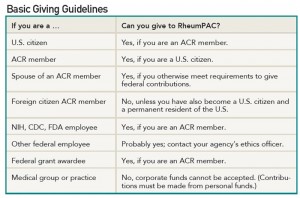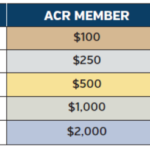
Image Credit: iQoncept/shutterstock.com
The classic American social studies lesson is How a Bill Becomes a Law, but a more pertinent lesson for U.S. rheumatologists today may be How a Dollar Bill Becomes a PAC. This article is a nuts-and-bolts primer on how exactly RheumPAC works. The purpose is to inform readers about how and why to participate.
Money In
Every U.S. ACR/ARHP member can legally donate to RheumPAC. Let’s repeat that: Every U.S. ACR/ARHP member can legally donate to RheumPAC. There’s no minimum donation, and the maximum is $5,000 per calendar year. U.S. citizens who are not ACR members and ACR members who are not U.S. citizens cannot donate. Students, trainees, academic and private fellows, and Masters of the College can all give.
Who gives? Nearly 4% (3.8%) of ACR members give. This contrasts with 21% of orthopedists, 10% of dermatologists and 7.8% of neurologists. Why do other specialties give more to their PACs? Because they recognize that advocacy efforts have more of an impact as a result of relationships established by their PAC.
Money Out
Where do RheumPAC dollars go? One hundred percent is distributed to political candidates for federal elected office in the U.S. House of Representatives and Senate. At this point, no state or local campaigns receive RheumPAC funding. In the 2013–2014 cycle, RheumPAC gave 52% to Democrats and 48% to Republicans. This split remains very close to 50/50, but may depend on the number of members up for election in each party in a given cycle.
Scale
RheumPAC gives anywhere from $1,000 to $10,000 to a selected candidate per cycle (two years). There are 535 members of Congress, and about 468 who are campaigning in a given cycle. Currently, the budget calls for $130,000 to be distributed in 2015 to more than 50 members of Congress. Several members of Congress also have leadership funds as a means to accept beyond-the-maximum contributions.
At this time, RheumPAC does not give to leadership funds. In other words, new RheumPAC contributions would allow the ACR to reach more than just 50 of the 400-plus candidates, and potentially contribute to leadership funds as well.
Impact
Donations are generally given at fundraisers in Washington, D.C., and in their home districts. At those fundraisers, a rheumatologist, ARHP member or ACR staffer has the opportunity to inform the candidate and key health staffers about issues that are important to our profession and patients. For example, there are opportunities to push specialty tiering legislation with healthcare committee chairs or talk with NIH appropriators directly about biomedical research funding.

